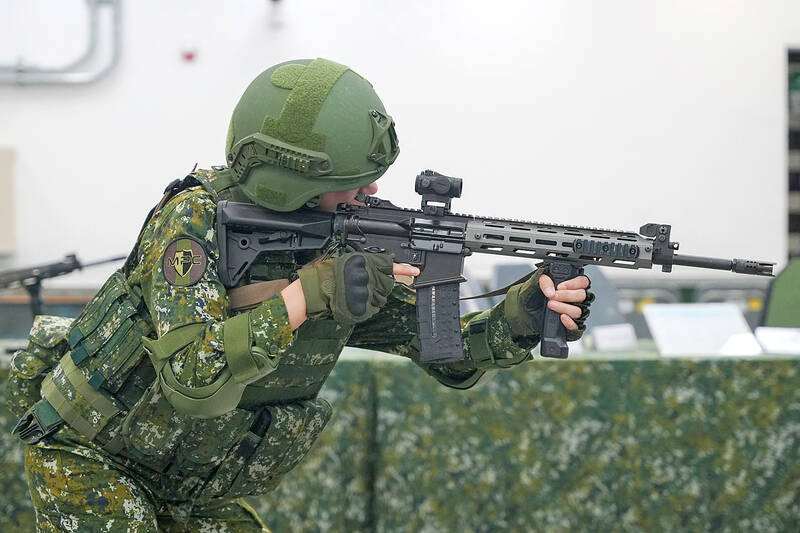The Ministry of National Defense yesterday showcased the updated capabilities of T112 rifles, which are soon to be used by Taiwan’s combat troops.
The Taiwan-manufactured rifle has undergone enhancements based on user feedback since it was first unveiled at the Taipei International Aerospace and Defense Industry Exhibition in September last year under the name XT112, the ministry told a media event at the 205th Armory in Kaohsiung.
The updated weapon features ergonomic improvements to the trigger and grip, as well as a new shell ejection deflector, it said.

Photo: Walid Berrazeg, AFP
The sling has a quick detach system that allows for more configurations based on operational needs, while the gun’s close-quarters combat capabilities have been enhanced due to its “dual-sided design,” the ministry said.
The effective range of the rifle, which fires 5.56-by-45mm cartridges, has been extended to 600m from 400m, and the barrel lifespan has been extended to 10,000 rounds from 6,000, it said.
The T112’s “three-round burst” mode has been changed to “two-round burst” based on US battlefield experience, it said.
Minister of National Defense Wellington Koo (顧立雄) last month announced that Taiwan’s military would procure 86,114 T112 rifles starting from next year that would be equipped with telescopic and red-dot sights in accordance with the operational needs of units.
The T112s would be distributed in stages to army personnel from next year to 2029 to replace T91 rifles, which are the standard weapon of combat troops, military sources familiar with the matter said.
The T91 has a spread of 14cm at 100m, while the updated T112’s spread is 9.8cm at the same distance, the ministry said.
The T91 and T112 models are produced by the 205th Armory.
The ministry in April announced that a first batch of 25,000 T112 rifles had been ordered.
In addition, the ministry also unveiled new bulletproof plating that will be mass produced from next year for distribution to Taiwan’s troops.
The new Taiwan-manufactured body armor has been developed according to Enhanced Small Arms Protective Insert (ESAPI) specifications used by the US military, MND officials said.
Made from ceramic materials and polyethylene fibers and weighing 2.2 kilograms, the plating can absorb 5.8 × 42 millimeter heavy rounds used by the Chinese military, the ministry said.
This is an improvement over the protection offered against 7.62 millimeter standard caliber rounds by plating currently used by Taiwan’s military, the MND said.
The protective area of the new body armor extends 25 centimeters by 30 centimeters, it added.

The Ministry of the Interior (MOI) is to tighten rules for candidates running for public office, requiring them to declare that they do not hold a Chinese household registration or passport, and that they possess no other foreign citizenship. The requirement was set out in a draft amendment to the Enforcement Rules of the Public Officials Election and Recall Act (公職人員選舉罷免法 ) released by the ministry on Thursday. Under the proposal, candidates would need to make the declaration when submitting their registration forms, which would be published in the official election bulletin. The move follows the removal of several elected officials who were

The Republic of China (ROC) is celebrating its 114th Double Ten National Day today, featuring military parades and a variety of performances and speeches in front of the Presidential Office in Taipei. The Taiwan Taiko Association opened the celebrations with a 100-drummer performance, including young percussionists. As per tradition, an air force Mirage 2000 fighter jet flew over the Presidential Office as a part of the performance. The Honor Guards of the ROC and its marching band also heralded in a military parade. Students from Taichung's Shin Min High School then followed with a colorful performance using floral imagery to represent Taiwan's alternate name

COVETED PRIZE: The US president would be a peace prize laureate should he persuade Xi Jinping to abandon military aggression against Taiwan, William Lai said US President Donald Trump should get the Nobel Peace Prize should he be able to convince Chinese President Xi Jinping (習近平) to abandon the use of force against Taiwan, President William Lai (賴清德) told a conservative US radio show and podcast in an interview. The US is Taiwan’s most important international backer, despite the absence of formal ties, but since Trump took office earlier this year he has not announced any new arms sales to the nation. Trump could meet Xi at the APEC summit in South Korea on Oct. 31 and Nov. 1. Lai, speaking on The Clay Travis and Buck Sexton

A Chinese takeover of Taiwan would severely threaten the national security of the US, Japan, the Philippines and other nations, while global economic losses could reach US$10 trillion, National Security Council Deputy Secretary-General Lin Fei-fan (林飛帆) wrote in an article published yesterday in Foreign Affairs. “The future of Taiwan is not merely a regional concern; it is a test of whether the international order can withstand the pressure of authoritarian expansionism,” Lin wrote in the article titled “Taiwan’s Plan for Peace Through Strength — How Investments in Resilience Can Deter Beijing.” Chinese President Xi Jinping’s (習近平) intent to take Taiwan by force